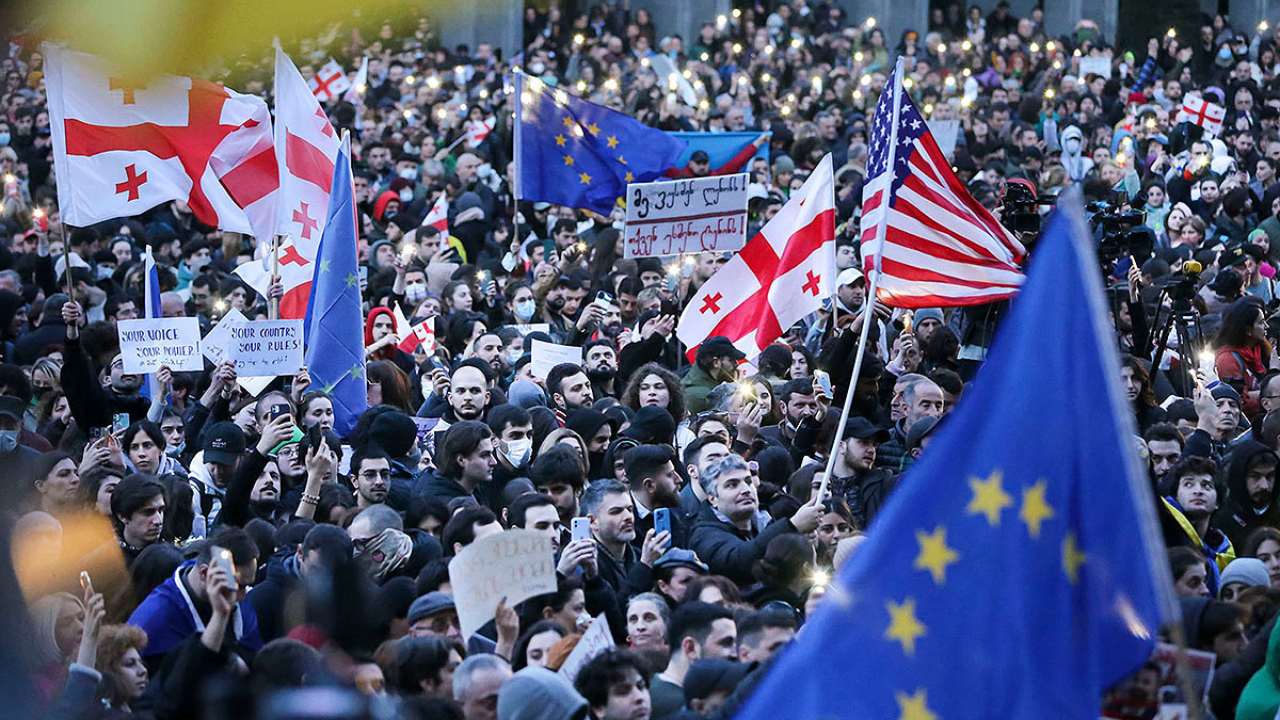
Publication
The West threatens Georgia

ARVAK Center comment, 04.05.2024
A political crisis continues in Georgia over the new “Law on Transparency of Foreign Influence”, which requires NGOs to register as “agents of foreign influence” if their foreign funding exceeds 20% of their total income.
The law was first proposed for discussion by the ruling “Georgian Dream” party in March 2023, but was withdrawn under pressure from opposition forces and the public. A year later, its new version was again the source of discontent among the opposition and public, who assessed it as a carbon copy of the Russian law. The authorities, in turn, cite the fact that the initiative was based on a revised version of the Foreign Agents Registration Act (FARA), adopted by the United States in 1938, whose experience was also adopted by the Russian State Duma (Parliament). According to the ruling party, the radical pro-Western Georgian opposition is determined to achieve the withdrawal of the bill, while similar laws exist in practically all countries of the civilized world.
The arguments put forward by the authorities and the ruling party are quite correct: the state does not want to restrict the activities of NGOs, but tends to ensure the transparency of their financing to identify the foreign beneficiaries of their activities. Meanwhile, the opposition’s main argument is that the law was “copied from the Russian State Duma”, which allegedly “is an order from Moscow”, which is “trying to destroy the institution of civil society in Georgia”.
At the initial stage of the latest Georgian twists, the collective West tried to keep a low profile, but when it became clear that the authorities were going to succeed in passing the law, Washington and Brussels intervened. On 01.05.2024 the head of the EU diplomacy Josep Borrell called on the Georgian authorities to calm down in their desire to suppress “peaceful actions” of the opposition and to remember that the issue of Georgia’s membership in the EU is at stake. The words of the head of European diplomacy about “peaceful actions” were clearly at odds with the fighting in the country’s parliament, the erection of barricades in the streets of Tbilisi, and the initiation of riots, which culminated in the attempt by protesters to storm the Georgian parliament building on the night of May 1.
On 02.05.2024 State Department spokesperson Matthew Miller threatened the Georgian authorities with: “The statements and actions of the Georgian government are incompatible with the democratic values that underpin membership in the EU and NATO and thus jeopardize Georgia’s path to Euro-Atlantic integration”. Nevertheless, the Georgian authorities have not given up their intentions. They even rejected the US proposal to start a “new strategic dialogue” with Washington to discuss and solve all pressing problems.
Thus, the interest of the main institutions of the collective West in the internal affairs of the South Caucasian republic is obvious, while official Moscow itself, contrary to the accusations of interference in the affairs of Tbilisi, has no reaction to what’s going on.
In the light of this objective fact, it can be assumed that a certain nervousness of the West is caused by the difficulties on the way of dragging Tbilisi into a confrontation with Russia, which the Georgian authorities are openly talking about. Already in September 2023, the Georgian Security Service declared that a new revolution was being prepared in the country with the help of NGOs supported and financed by the West and the participation of the Georgian volunteers fighting for Ukraine. The attempt was deliberately stopped at that time, but in the absence of a regulating law, financial resources continue to flow into the republic, aimed at deposing the current leadership and bringing to power forces ready to confront with the Russian Federation right up to the point of war.
Given the unfavorable developments on the Ukrainian frontline for the Western coalition, Georgian neutrality is becoming an “unaffordable luxury” for Washington and Brussels. Meanwhile, at the initial stage of the implementation of the strategy to separate Ukraine from Russia, it was Tbilisi that was destined to play the role of an auxiliary force. Its accession to Kiev was intended to deprive Russia of its dominant positions in the Black Sea basin.
According to various expert assessments, the West has little time left to prevent Ukraine’s military defeat. Under these conditions, it is impossible to create a “Southern front” against Russia without revolutionary changes in Georgia. But it is the very law, which became the subject of bitter disputes, which is able to show all the channels that are going to water the next “Georgian flowerbed”.
